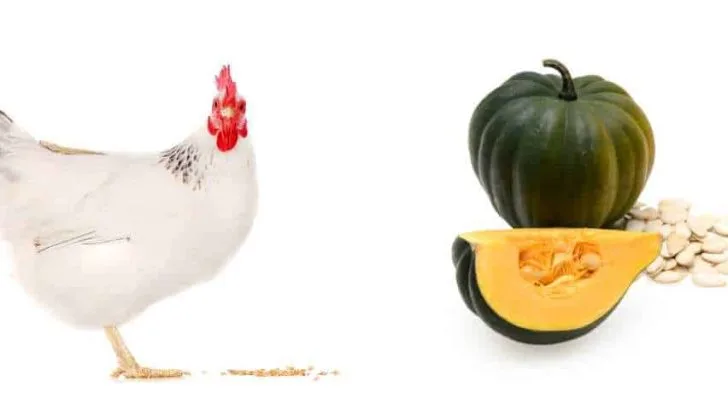Vegetables are a great addition to a healthy diet for all animals. A balanced diet provides many health benefits and should always be your priority. But have you ever asked yourself can chickens eat acorn squash?
Squash is a type of gourd specifically grown to be eaten, and it comes in a lot of forms and varieties. There is evidence that it was domesticated at least 8,000 years ago, and today we use it in many recipes (from soups to desserts), so why would it be a bad choice for your flock right?
Aside from food, squash is also important as an oil source, explaining why they were cultivated a long time ago. So today, I will talk about why feeding your flock with acorn squash (or any other squash) is highly beneficial.
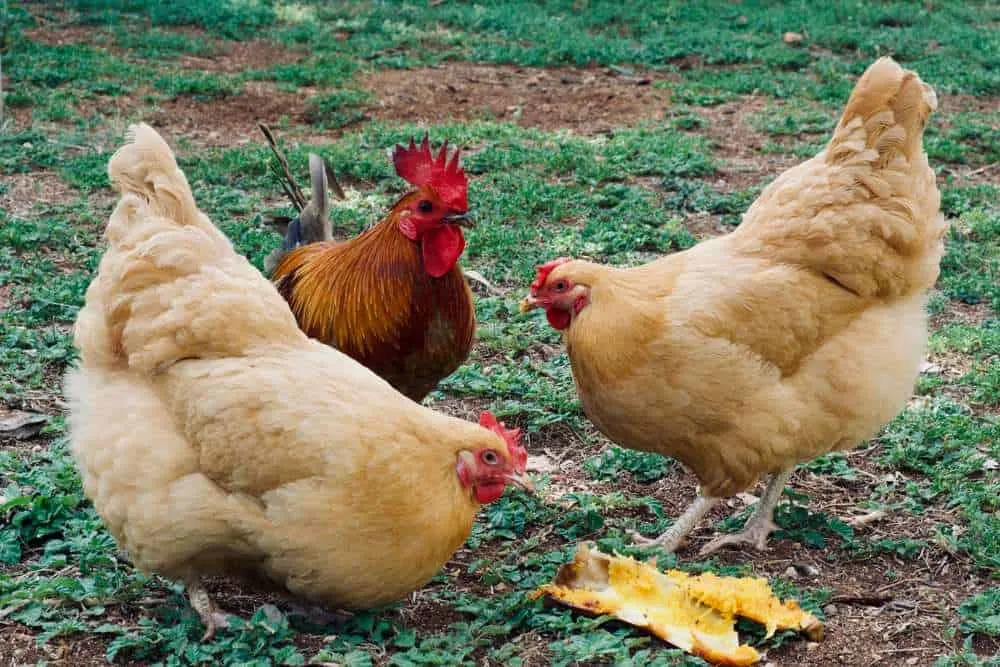
Can Chickens Eat Acorn Squash?
The short answer is yes. It is recommended to include this powerful veggie in their diet since they have a lot of health benefits to offer. One of the most important things is that squash is a natural dewormer.
Veggies like pumpkins, gourds, squash, cucumbers, cantaloupes, and watermelons are all from the gourd family. For hundreds of years, seeds from these veggies are used as a natural dewormer for livestock and humans as well.
Many chicken-keepers tend to feed chickens with pumpkin or squash seeds for a week each fall and spring, and this way, they prevent internal parasite overloads. However, no evidence proves the efficacy of the seeds from these plants as a natural dewormer in chickens, but there is no harm in trying, right?
But since there has been an increase in concern over parasitic worms becoming resistant to all commercially available synthetic dewormers, there is no harm in trying this all-natural approach, right?
The seeds from pumpkin and winter squash reduce worm loads in goats, and the seeds from summer squash were found to reduce worms in mice. So, stick with it and give it a try since it is reasonable to think that if these seeds can reduce worms in other animals, they might also help deworm your flock.
Why Are Deworming Chickens Important?
Chickens who live or spend most of their time outdoors probably carry parasitic worms because they naturally pick them up as they scratch in the dirt, which can’t be avoided. In fact, it is quite normal for healthy chickens to have some level of these worms in their guts.
However, the worms attach to the stomach lining feed off from the chickens; this way, they prevent them from absorbing the nutrients that they ingest and cause malnutrition. So when worm levels become too high, it can even threaten the chicken’s life.
Signs that the level of worms in your chickens is too high:
- Visible worms in their droppings or in the eggs
- Decreased egg production
- Pale egg yolks
- Weight loss
- Increased feed consumption
Deworming the flock periodically contributes to preventing worm loads from becoming too high. That’s why you should start feeding your flock with raw pumpkin or squash seeds for a week every spring and fall as a preventive measurement.
The seeds that come from gourds family veggies are coated with cucurbitacin, which has anthelmintic properties. Cucurbitacin is a substance that paralyzes worms and their larvae which helps to flush out parasites of the chickens’ system.
The amount of cucurbitacin can significantly vary depending on the variety and maturity of the squash. It helps to know that the seeds from larger, mature gourd family members usually contain greater amounts of cucurbitacin, so you can’t go wrong when picking out the largest squash you see on the market.
This also means that the amount to feed is inexact and that it is usually up to you to feed free-choice and let chickens self-regulate consumption.
Other Health Benefits
Veggies from a gourd family also contain a lot of vitamins and minerals. You can serve these veggies cooked or raw, but feeding raw is better since this way, veggies preserve all the nutritional value.
Chickens get so entertained when eating the whole squash, well not whole; cut it at least in quarters and watch them go crazy. I guarantee you a lot of fun watching.
Acorn squash contains large amounts of:
- Iron
- Magnesium
- Niacin
- Phosphorous
- Thiamine
- Vitamins A, C, and E
- Copper
- Manganese
- Potassium
They are as well an excellent source of dietary fiber, and at the same time, acorn squash contains little saturated fat, cholesterol, and sodium.
The seeds are rich in protein, magnesium, and zinc. The actual amount of these nutrients depends on the variety and maturity level of the squash.
Around 94% of raw acorn squash is water, 3% are carbohydrates, 1 % proteins, and the rest is a mix of different types of fat but in low quantities. One hundred grams of acorn squash have only 16 calories, so this veggie will definitely not make your chicken gain weight.
There are different types of vitamins in squash. Vitamin C has the highest amount. Other vitamins like A, B1, B2, B3, B5, B6 E, and K are present in smaller amounts.
Chickens will grow and lay the best eggs when they have a well-balanced diet with a lot of different food types. The best way to feed them is to serve everything in moderation. There are some things you should never feed your chickens, such as garlic, onions, or green potatoes.
Squash Seeds
All squash seeds contain vitamin E, crude protein, vitamins B, carotenoids, and minerals. Keep in mind that they also come with some saturated and unsaturated oils and fatty acids.
There is no need to be afraid of choking hazards when serving seeds to your flock. These aren’t harmful to a chicken in any way, and they will know how to eat them.
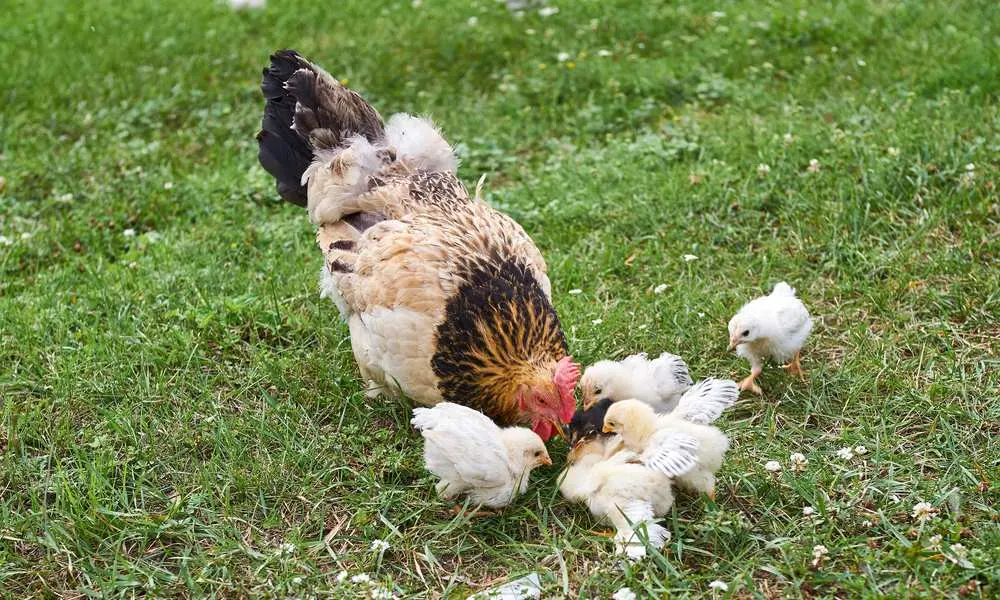
How To Feed Chickens With Acorn Squash?
Like I already said, cut the squash into pieces since the exterior is quite tough, and it will give your flock a hard time eating it if you serve it whole. In case you leave an entire squash next to them, they will usually ignore it until it gets mushy and tender. By that time, it will become pretty degraded and probably get moldy, which is no good since it can be poisonous to your flock.
Just cut it in quarters, and you don’t have to remove the exterior; only wash it properly to remove any possible pesticide or some substance that they might be sprayed with.
You can also feed your chickens with roasted, baked, or boiled acorn squash. It really doesn’t matter how you prepared it as long as you are eager to spoil your flock with this juicy and tender treat.
Acorn squash is best for your chicken during the cold seasons since they provide a lot of nutrition, and it will also boost their immune system and help them to endure the winter easily. Also, be aware that when you feed hens with squash and pumpkin, you will notice that the egg yolk will get a deeper orange color, and that is fine.
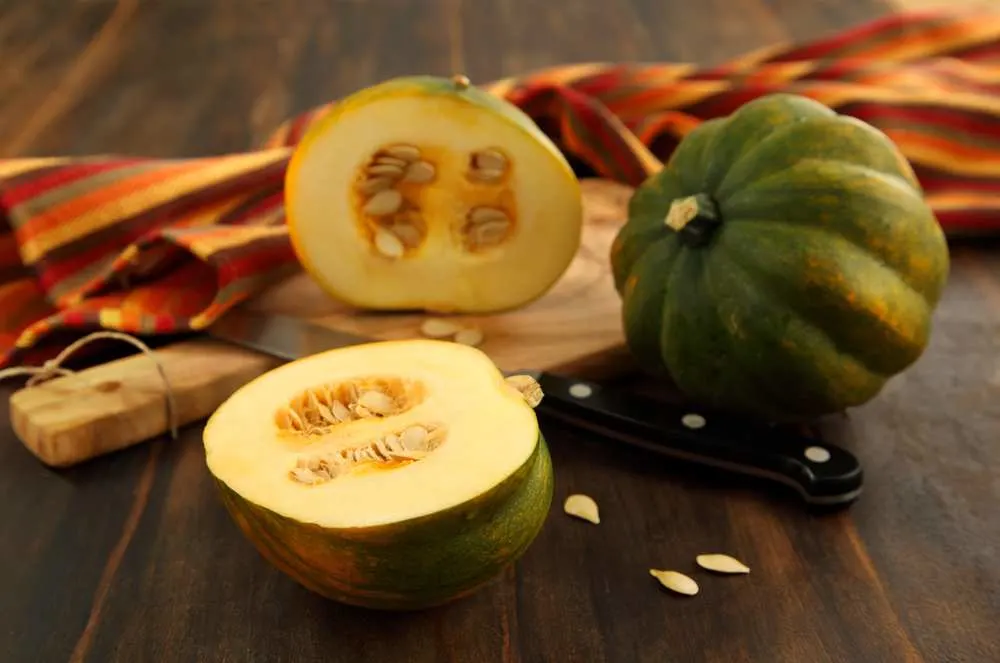
How To Store Squash To Keep It In Good Shape Through The Year?
It’s easy to feed the squash to your chickens throughout the year when you know how to properly store them. However, autumn is the best time for feeding squash to your hens because they are easily obtainable at that time of the year.
Also, protein in the seeds is also highly beneficial for your chickens that are usually molting and growing new feathers during the autumn.
You can keep squash and pumpkins in good shape for months if you properly cure them. Almost all members of the gourd family must be cured before storage except acorn squash, delicata squash, and sweet dumpling, which go directly in the storage.
To cure squash and pumpkins, simply keep them at room temperature for 10 to 20 days. After that, they should be transferred to a dry and cool place like a basement or root cellar.
For best results, store these veggies in a single layer so that they aren’t touching each other to avoid rot spreading. If any have soft spots, cuts or breaks, or missing stems, use them first since they will spoil first.
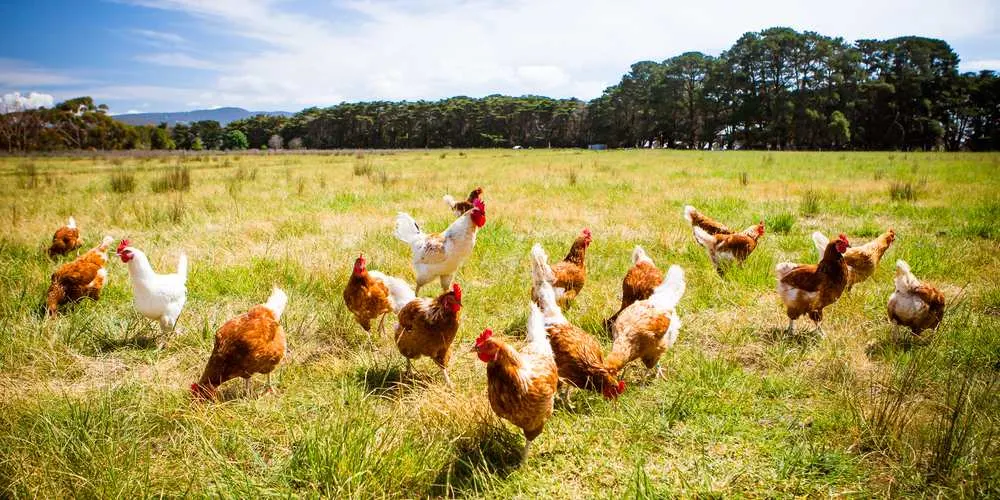
Let’s Recapitulate
Pumpkins and squash are an ideal treat for poultry of all kinds. It is easy to prepare (cut it open and voila), it is full of nutrition that will significantly boost their overall health, and on top of all, your flock will have a lot of fun gobbling on them.
Treat your chickens right, as well like all other pets love to indulge in treats. Their diet should predominantly be composed of chicken feed enhanced with oyster shells, grit, and clean drinking water; however, it’s nice to treat them to something different from time to time.

